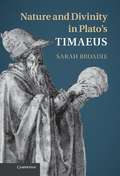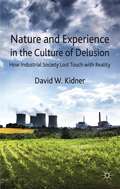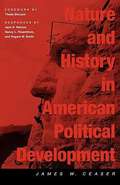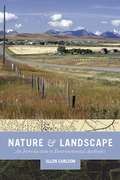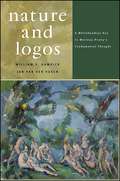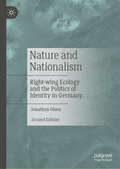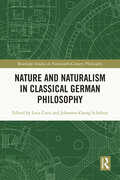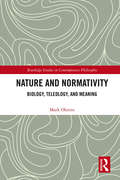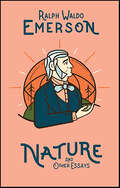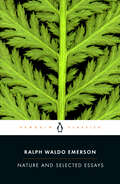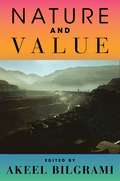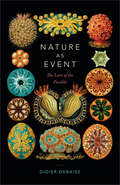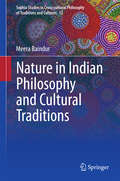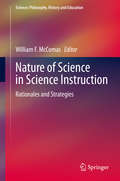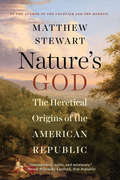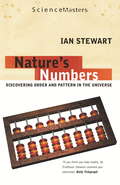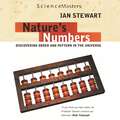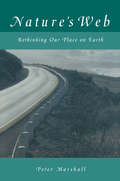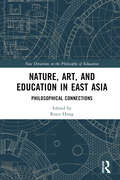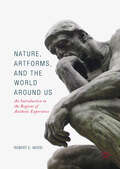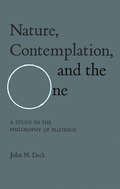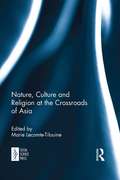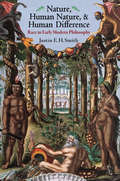- Table View
- List View
Nature and Divinity in Plato's Timaeus
by Sarah BroadiePlato's Timaeus is one of the most influential and challenging works of ancient philosophy to have come down to us. Sarah Broadie's rich and compelling study proposes new interpretations of major elements of the Timaeus, including the separate Demiurge, the cosmic 'beginning', the 'second mixing', the Receptacle and the Atlantis story. Broadie shows how Plato deploys the mythic themes of the Timaeus to convey fundamental philosophical insights and examines the profoundly differing methods of interpretation which have been brought to bear on the work. Her book is for everyone interested in Ancient Greek philosophy, cosmology and mythology, whether classicists, philosophers, historians of ideas or historians of science. It offers new findings to scholars familiar with the material, but it is also a clear and reliable resource for anyone coming to it for the first time.
Nature and Experience in the Culture of Delusion: How Industrial Society Lost Touch with Reality
by David W. KidnerIndustrialism has alienated us from nature, disconnected us from our own embodiment, and blinded us to the character of the technological society we have ourselves have produced. This book brings together ideas and research from both social and natural sciences to throw light on the hidden dimensions of industrial life, showing how the emerging global economic system has dissolved our embodied subjectivity into industrial processes. The symbolic abilities that have allowed us to dominate all other creatures have now entrapped us within systems that we do not understand and have little control over, making us as vulnerable to the extension of economic and technological ideologies as our ancestors were to the natural threats that surrounded them. If we are to regain our humanity and integrity, the essential first step, outlined in this book, is to recognise and challenge the sources of our own powerlessness.
Nature and History in American Political Development: A Debate (Alexis De Tocqueville Lectures in American Politics #1)
by Theda Skocpol Jack Rakove Nancy Rosenblum James Ceaser Rogers SmithIn this inaugural volume of the Alexis de Tocqueville Lectures, James Ceaser traces the way certain "foundational" ideas—including nature, history, and religion—have been understood and used over the course of American history. Ceaser treats these ideas as elements of political discourse that provide the ground for other political ideas, such as liberty or equality. Three critical commentators challenge Ceaser's arguments, and a spirited debate about large and enduring questions in American politics ensues.
Nature and Landscape: An Introduction to Environmental Aesthetics
by Allen CarlsonThe roots of environmental aesthetics reach back to the ideas of eighteenth-century thinkers who found nature an ideal source of aesthetic experience. Today, having blossomed into a significant subfield of aesthetics, environmental aesthetics studies and encourages the appreciation of not just natural environments but also human-made and human-modified landscapes. Nature and Landscape is an important introduction to this rapidly growing area of aesthetic understanding and appreciation. Allen Carlson begins by tracing the development of the field's historical background, and then surveys contemporary positions on the aesthetics of nature, such as scientific cognitivism, which holds that certain kinds of scientific knowledge are necessary for a full appreciation of natural environments. Carlson next turns to environments that have been created or changed by humans and the dilemmas that are posed by the appreciation of such landscapes. He examines how to aesthetically appreciate a variety of urban and rural landscapes and concludes with a discussion of whether there is, in general, a correct way to aesthetically experience the environment.
Nature and Logos: A Whiteheadian Key to Merleau-Ponty's Fundamental Thought
by William S. Hamrick Jan Van der VekenThis is the first booklength account of how Maurice Merleau-Ponty used certain texts by Alfred North Whitehead to develop an ontology based on nature, and how he could have used other Whitehead texts that he did not know in order to complete his last ontology. This account is enriched by several of Merleau-Ponty's unpublished writings not previously available in English, by the first detailed treatment of certain works by F.W.J. Schelling in the course of showing how they exerted a substantial influence on both Merleau-Ponty and Whitehead, and by the first extensive discussion of Merleau-Ponty's interest in the Stoics's notion of the twofold logos—the logos endiathetos and the logos proforikos. This book provides a thorough exploration of the consonance between these two philosophers in their mutual desire to overcome various bifurcations of nature, and of nature from spirit, that continued to haunt philosophy and science since the 17th-century.
Nature and Nationalism: Right-wing Ecology and the Politics of Identity in Germany
by Jonathan OlsenIn this new edition of his now classic 1999 book, Jonathan Olsen explores the relationship between the far right and the environment, or what he terms “right-wing ecology.” Arguing that radical environmentalism is not exclusively a domain of the left, Olsen shows how many of Germany's far right parties and groups ground their ecological ideology in an anti-universalist anthropology which sees human beings as naturally 'rooted' in specific nations and cultural traditions. Pollution in this discourse signifies not only the disruption of the natural world, but the social world as well, thus providing an environmental justification for an anti-immigrant politics which finds resonance outside the specific milieu of the far right. A rigorously theoretical book, Nature and Nationalism challenges our understanding of the deeply ambiguous ways in which 'nature' functions to legitimate a wide variety of political ideas.
Nature and Naturalism in Classical German Philosophy (Routledge Studies in Nineteenth-Century Philosophy)
by Luca Corti Johannes-Georg SchüleinThis book offers the first comprehensive exploration of the relevance of naturalism and theories of nature in Classical German Philosophy. It presents new readings from internationally renowned scholars on Kant, Jacobi, Goethe, the Romantic tradition, Fichte, Schelling, Hegel, and Marx that highlight the significance of conceptions of nature and naturalism in Classical German Philosophy for contemporary concerns. The collection presents an inclusive view: it goes beyond the usual restricted focus on single thinkers to encompass the tradition as a whole, prompting dialogue among scholars interested in different authors and areas. It thus illuminates the post-Kantian tradition in a new, wider sense. The chapters also mobilize a productive perspective at the intersection of philosophy and history by combining careful textual and historical analysis with argument-based philosophizing. Overall, the book challenges the stereotypical view that Classical German Philosophy offers at best only an idealistic, one-sided, anachronistic, and theological view of nature. It invites readers to put traditional views in dialogue with current discussions of nature and naturalism. Nature and Naturalism in Classical German Philosophy will be of interest to scholars and advanced students working on Classical German Philosophy, 19th-Century Philosophy, and contemporary perspectives on naturalism.
Nature and Normativity: Biology, Teleology, and Meaning (Routledge Studies in Contemporary Philosophy)
by Mark OkrentNature and Normativity argues that the problem of the place of norms in nature has been essentially misunderstood when it has been articulated in terms of the relation of human language and thought, on the one hand, and the world described by physics on the other. Rather, if we concentrate on the facts that speaking and thinking are activities of organic agents, then the problem of the place of the normative in nature becomes refocused on three related questions. First, is there a sense in which biological processes and the behavior of organisms can be legitimately subject to normative evaluation? Second, is there some sense in which, in addition to having ordinary causal explanations, organic phenomena can also legitimately be seen to happen because they should happen in that way, in some naturalistically comprehensible sense of ‘should’, or that organic phenomena happen in order to achieve some result, because that result should occur? And third, is it possible to naturalistically understand how human thought and language can be legitimately seen as the normatively evaluable behavior of a particular species of organism, behavior that occurs in order to satisfy some class of norms? This book develops, articulates, and defends positive answers to each of these questions.
Nature and Other Essays
by Ralph Waldo EmersonRalph Waldo Emerson’s famous essay “Nature” declared that understanding nature was the key to understanding God and reality, and laid the groundwork for transcendentalism. His legacy of boldly questioning the doctrine of his day and connecting with nature will resonate with today’s readers in search of meaning and enlightenment. Essays include “Nature” (1836) and Emerson’s first series, published in 1841: “History,” “Self-Reliance,” “Compensation,” “Spiritual Laws,” “Love,” “Friendship,” “Prudence,” “Heroism,” “The Over-Soul,” “Circles,” “Intellect,” and “Art.” Nature and Other Essays joins Gibbs Smith’s best-selling Wilderness series. Standing beside the works of his protégée Henry David Thoreau, as well as John Muir, Mark Twain, Walt Whitman, and Jack London, these essays are reissued to encourage and inspire philosophers, travelers, campers, and contemporary naturalists.
Nature and Selected Essays
by Ralph Waldo EmersonAn indispensible look at Emerson's influential life philosophyThrough his writing and his own personal philosophy, Ralph Waldo Emerson unburdened his young country of Europe's traditional sense of history and showed Americans how to be creators of their own circumstances. His mandate, which called for harmony with, rather than domestication of, nature, and for a reliance on individual integrity, rather than on materialistic institutions, is echoed in many of the great American philosophical and literary works of his time and ours, and has given an impetus to modern political and social activism.Larzer Ziff's introduction to this collection of fifteen of Emerson's most significant writings provides the important backdrop to the society in which Emerson lived during his formative years.For more than seventy years, Penguin has been the leading publisher of classic literature in the English-speaking world. With more than 1,700 titles, Penguin Classics represents a global bookshelf of the best works throughout history and across genres and disciplines. Readers trust the series to provide authoritative texts enhanced by introductions and notes by distinguished scholars and contemporary authors, as well as up-to-date translations by award-winning translators.
Nature and Supernature (St. Michael's Lectures #Vol. 1973)
by E. L. MascallIn the fall of 1972, St. Michael’s Jesuit School of Philosophy and Letters at Gonzaga University inaugurated the St. Michael’s Lectures as a forum for outstanding international scholars to examine the question of God in modern thought. The theme for the lecture series is much the same as that of the famous Gifford Lectures, but the approach is not only philosophical but also theological. <p><p>The uniqueness lies primarily in the dynamic inherent in the structure of the series. A lecture in a tripartite form (over a three-day period) is given each fall. As the series unfolds, each lecturer is to enter into dialogue with the immediately preceding lecturer and, to the extent that he wishes, he may respond to other former lecturers in the series. At the same time, each expands the discussion by his or her own creative contribution. As a result there will develop an ongoing exchange among thinkers of international reputation.
Nature and Value
by Jonathan Schell Jedediah Purdy Nikolas Kompridis David Bromwich Carol Rovane Joanna Picciotto Robert Pollin Sanjay Reddy Jan Zalasiewicz Bina Gogineni Anthony Laden Kyle Nichols James Hamilton TullyToday, as we confront an unprecedented environmental crisis of our own making, it is more urgent than ever to consider the notion of nature and our place within it. This book brings together essays that individually and as a whole present a detailed and rigorous multidisciplinary exploration of the concept of nature and its wider ethical and political implications.A distinguished list of scholars take up a broad range of questions regarding the relations between the human subject and its natural environment: when and how the concept of nature gave way to the concept of natural resources; the genealogy of the concept of nature through political economy, theology, and modern science; the idea of the Anthropocene; the prospects for green growth; and the deep alienation of human beings in the modern period from both nature and each other. By engaging with a wide range of scholarship, they ultimately converge on a common outlook that is both capacious and original. The essays together present a revaluation of the natural world that seeks to reshape political and ethical ideals and practice with a view to addressing some of the fundamental concerns of our time.Nature and Value features widely known scholars in a broad swath of disciplines, ranging from philosophy, politics, and political economy to geology, law, literature, and psychology. They include Jonathan Schell, David Bromwich, James Tully, Jedediah Purdy, Robert Pollin, Jan Zalasiewicz, Carol Rovane, Sanjay Reddy, Joanna Picciotto, Anthony Laden, Nikolas Kompridis, Bina Gogineni, Kyle Nichols, and the editor, Akeel Bilgrami.
Nature as Event: The Lure of the Possible
by Didier Debaise Michael HalewoodWe have entered a new era of nature. What remains of the frontiers of modern thought that divided the living from the inert, subjectivity from objectivity, the apparent from the real, value from fact, and the human from the nonhuman? Can the great oppositions that presided over the modern invention of nature still claim any cogency? In Nature as Event, Didier Debaise shows how new narratives and cosmologies are necessary to rearticulate that which until now had been separated. Following William James and Alfred North Whitehead, Debaise presents a pluralistic approach to nature. What would happen if we attributed subjectivity and potential to all beings, human and nonhuman? Why should we not consider aesthetics and affect as the fabric that binds all existence? And what if the senses of importance and value were no longer understood to be exclusively limited to the human?
Nature in Indian Philosophy and Cultural Traditions
by Meera BaindurWorking within a framework of environmental philosophy and environmental ethics, this book describes and postulates alternative understandings of nature in Indian traditions of thought, particularly philosophy. The interest in alternative conceptualizations of nature has gained significance after many thinkers pointed out that attitudes to the environment are determined to a large extent by our presuppositions of nature. This book is particularly timely from that perspective. It begins with a brief description of the concept of nature and a history of the idea of nature in Western thought. This provides readers with a context to the issues around the concept of nature in environmental philosophy, setting a foundation for further discussion about alternate conceptualizations of nature and their significance. In particular, the work covers a wide array of textual and non-textual sources to link and understand nature from classical Indian philosophical perspectives as well as popular understandings in Indian literary texts and cultural practices. Popular issues in environmental philosophy are discussed in detail, such as: What is 'nature' in Indian philosophy? How do people perceive nature through landscape and mythological and cultural narratives? In what ways is nature sacred in India? To make the discussion relevant to contemporary readers, the book includes a section on the ecological and ethical implications of some philosophical concepts and critical perspectives on alternate conceptualizations of nature.
Nature of Science in General Chemistry Textbooks
by Arelys Maza Mansoor NiazResearch in science education has recognized the importance of history and philosophy of science (HPS). Nature of science (NOS) is considered to be an essential part of HPS with important implications for teaching science. The role played by textbooks in developing students' informed conceptions of NOS has been a source of considerable interest for science educators. In some parts of the world, textbooks become the curriculum and determine to a great extent what is taught and learned in the classroom. Given this background and interest, this monograph has evaluated NOS in university level general chemistry textbooks published in U.S.A. Most textbooks in this study provided little insight with respect to the nine criteria used for evaluating NOS. Some of the textbooks, however, inevitably refer to HPS and thus provide guidelines for future textbooks. A few of the textbooks go into considerable detail to present the atomic models of Dalton, Thomson, Rutherford, Bohr and wave mechanical to illustrate the tentative nature of scientific theories --- an important NOS aspect. These results lead to the question: Are we teaching science as practiced by scientists? An answer to this question can help us to understand the importance of NOS, by providing students an HPS-based environment, so that they too (just like the scientists) feel the thrill and excitement of discovering new things. This monograph provides students and teachers guidelines for introducing various aspects of NOS, based on historical episodes.
Nature of Science in Science Instruction: Rationales and Strategies (Science: Philosophy, History and Education)
by William F. McComasThis book offers a comprehensive introduction to Nature of Science (NOS), one of the most important aspects of science teaching and learning, and includes tested strategies for teaching aspects of the NOS in a variety of instructional settings. In line with the recommendations in the field to include NOS in all plans for science instruction, the book provides an accessible resource of background information on NOS, rationales for teaching these targeted NOS aspects, and – most importantly – how to teach about the nature of science in specific instructional contexts. The first section examines the why and what of NOS, its nature, and what research says about how to teach NOS in science settings. The second section focuses on extending knowledge about NOS to question of scientific method, theory-laden observation, the role of experiments and observations and distinctions between science, engineering and technology. The dominant theme of the remainder of the book is a focus on teaching aspects of NOS applicable to a wide variety of instructional environments.
Nature's God: The Heretical Origins of the American Republic
by Matthew StewartLonglisted for the National Book Award. Where did the ideas come from that became the cornerstone of American democracy? America's founders intended to liberate us not just from one king but from the ghostly tyranny of supernatural religion. Drawing deeply on the study of European philosophy, Matthew Stewart brilliantly tracks the ancient, pagan, and continental ideas from which America's revolutionaries drew their inspiration. In the writings of Spinoza, Lucretius, and other great philosophers, Stewart recovers the true meanings of "Nature's God," "the pursuit of happiness," and the radical political theory with which the American experiment in self-government began.
Nature's Numbers (SCIENCE MASTERS)
by Ian StewartA mathematical sightseeing tour of the natural world from the author of THE MAGICAL MAZEWhy do many flowers have five or eight petals, but very few six or seven? Why do snowflakes have sixfold symmetry? Why do tigers have stripes but leopards have spots?Mathematics is to nature as Sherlock Holmes is to evidence. Mathematics can look at a single snowflake and deduce the atomic geometry of its crystals; it can start with a violin string and uncover the existence of radio waves. And mathematics still has the power to open our eyes to new and unsuspected regularities - the secret structure of a cloud or the hidden rhythms of the weather. There are patterns in the world we are now seeing for the first time - patterns at the frontier of science, yet patterns so simple that anybody can see them once they know where to look.
Nature's Numbers (SCIENCE MASTERS)
by Ian StewartWhy do many flowers have five or eight petals, but very few six or seven? Why do snowflakes have sixfold symmetry? Why do tigers have stripes but leopards have spots?Mathematics is to nature as Sherlock Holmes is to evidence. Mathematics can look at a single snowflake and deduce the atomic geometry of its crystals; it can start with a violin string and uncover the existence of radio waves. And mathematics still has the power to open our eyes to new and unsuspected regularities - the secret structure of a cloud or the hidden rhythms of the weather. There are patterns in the world we are now seeing for the first time - patterns at the frontier of science, yet patterns so simple that anybody can see them once they know where to look.(p) 1997 Orion Publishing Group
Nature's Web: Rethinking Our Place on Earth (Cassell Global Issues Ser.)
by Peter MarshallThis powerful book provides the first comprehensive overview of the intellectual roots of the worldwide environmental movement - from ancient religions and philosophies to modern science and ethics - and synthesizes them into a new philosophy of nature in which to ground our moral values and social action. It traces the origins and evolution of the dominant worldview that has built our industrial, technocratic, man-centered civilization, and brought us to the current ecological crisis. At the same time, it uncovers an alternative cultural tradition in the world's different religions and philosophies and describes how these ideas are now surfacing and coalescing to form an ecological sensibility and a new vision of nature which recognizes the inter-relatedness of all living things. Finally, this book integrates these varied traditions with modern physics and the science of ecology into a larger philosophical whole that provides the environmental movement with a comprehensive vision of an organic and sustainable society in harmony with nature. As ecological disasters continue to threaten our planet, becoming worse with every passing moment of indifference, it has become clear that we must take action. We must change our relationship with nature, and return to the days when our lives were intimately connected to and dependent upon the natural world. Nature's Web lays the foundations for that change by explaining where our complex ideas about nature come from, why they are wrong, and what we can do to change them.
Nature, Art, and Education in East Asia: Philosophical Connections (New Directions in the Philosophy of Education)
by Ruyu HungThis volume explores the deeply interwoven connection of education, art and nature in the context of East Asia. With contributions from authors in South Korea, Japan and Taiwan, the book considers unnoticed but significant themes involved in the interplay of nature, art, and education. It manifests how nature and art can educate, and how education and nature play the role of art. The chapters explore a range of themes relevant to East Asian characteristics, including skill acquisition, Japanese calendar arts and ritual of feelings, garden architecture, the ritualised body, collaborative poetry art, translational language between humans and nature, the Confucian classical Six Arts, the artistic embodiment of the Kyoto School, and the heritage art based education in Korea. The authors examine these themes in novel ways to bring to light the relevance of the East Asian insights to the contemporary global world. This book is an outstanding resource to all researchers, scholars, and students interested in educational aesthetics, philosophy of education, East Asian studies, comparative education and intercultural education.
Nature, Artforms, and the World Around Us
by Robert E. WoodThis book provides a comprehensive view of the aesthetic realm, placing the various major artforms within the setting of nature and the built environment as they arise within the field of experience. Each chapter displays the regional ontology of the form considered: the comprehensive set of eidetic features that limn the space of the art. It draws upon artists' statements, writings of key figures in the history of philosophy--including Plato, Hegel, Dewey, and Heidegger--and writings from various commentators on art. This volume is unique in its systematic and phenomenological approach, and in how it addresses aesthetics writ large.
Nature, Contemplation, and the One: A Study in the Philosophy of Plotinus
by John DeckPlotinus has been so highly regarded as a mystic that his importance as a philosopher has sometimes been thrown into eclipse. Yet neoplatonic philosophy lives in and through his works; indeed, his original development of Platonic and Aristotelian themes stands as a kind of summation of Greek philosophy as it first came to be known in the Christian West. In Nature, Contemplation, and the One, Professor Deck has undertaken a reappraisal of Plotinus' thought from the standpoint of a central doctrine in the Enneads, that of nature as contemplation. This new view enables him to show that the producing of the physical world by means of contemplation is an internally consistent doctrine with ramifications throughout the Plotinian view of being, causality, and the generation of a plural universe by the self-subsistent One. The result is a systematic account of Plotinus' major teachings, and a fresh view of their meaning and philosophic importance. Professor Deck has appended a new translation of the parts of the Enneads which are central to the doctrine of nature as contemplation, and his study proceeds by careful reference to the original texts. Students, philosophers, and historians will welcome this important and unusually clear-headed approach to a major figure in Western thought.
Nature, Culture and Religion at the Crossroads of Asia (Social Science Press Ser.)
by Marie Lecomte-TilouineThis book explores how ethnic groups living in the Himalayan regions understand nature and culture. The first part addresses the opposition between nature and culture in Asia’s major religious traditions such as Hinduism, Buddhism, Islam and Shamanism. The second part brings together specialists of different representative groups living in the heterogeneous Himalayan region. They examine how these indigenous groups perceive their world. This includes understanding their mythic past, in particular, the place of animals and spirits in the world of humans as they see it and the role of ritual in the everyday lives of these people. The book takes into account how these various perceptions of the Himalayan peoples are shaped by a globalized world. The volume thus provides new ways of viewing the relationship between humans and their environment.
Nature, Human Nature, and Human Difference
by Justin E. H. SmithPeople have always been xenophobic, but an explicit philosophical and scientific view of human racial difference only began to emerge during the modern period. Why and how did this happen? Surveying a range of philosophical and natural-scientific texts, dating from the Spanish Renaissance to the German Enlightenment, Nature, Human Nature, and Human Difference charts the evolution of the modern concept of race and shows that natural philosophy, particularly efforts to taxonomize and to order nature, played a crucial role.Smith demonstrates how the denial of moral equality between Europeans and non-Europeans resulted from converging philosophical and scientific developments, including a declining belief in human nature's universality and the rise of biological classification. The racial typing of human beings grew from the need to understand humanity within an all-encompassing system of nature, alongside plants, minerals, primates, and other animals. While racial difference as seen through science did not arise in order to justify the enslavement of people, it became a rationalization and buttress for the practices of trans-Atlantic slavery. From the work of François Bernier to G. W. Leibniz, Immanuel Kant, and others, Smith delves into philosophy's part in the legacy and damages of modern racism. With a broad narrative stretching over two centuries, Nature, Human Nature, and Human Difference takes a critical historical look at how the racial categories that we divide ourselves into came into being.
